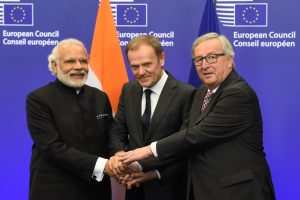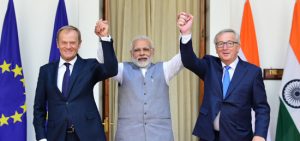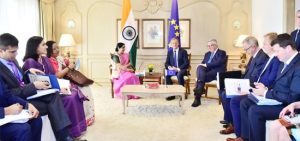
Unfazed by Brexit, India and the European Union are set to map the next steps in their mutually enriching and empowering partnership at their 14th summit in New Delhi. The 14th summit is taking place against a mutating geopolitical and geo-economic landscape, marked by uneven global economic growth and the rise of radicalism and alt-right forces in Europe and elsewhere.
In his interaction with EU leaders, including Donald Tusk, President of the European Council, and Jean-Claude Juncker, President of the European Commission, India’s Prime Minister Narendra Modi is expected to raise the bar for India-EU partnership in both economic and strategic spheres.
Reviving FTA, upscaling investment
The overarching focus will be on providing a fresh political impetus to resume the India-EU FTA negotiations, which have been deadlocked for a decade over a host of contentious issues. The EU is demanding drastic reduction in duties for automobiles and wines and spirits. India, on the other hand, is pressing for data secure status and free movement of its skilled professionals in EU countries. For the negotiations to begin and achieve a closure, both sides have to signal flexibility and accommodation on these key issues.
India’s economic growth may have slowed down in recent months, but it still remains one of the fastest growing major economies, offering the EU an ever growing market of more than half a billion middle class consumers. In his talks with EU leaders, PM Modi is expected to showcase a host of path-breaking economic reforms undertaken by his government, which has enhanced ease of doing business and have raised attractiveness of the country as a major foreign investment destination. The top priority, from India’s point of view, will be to get more investments from European countries.
 The unilateral termination of Bilateral Investment Treaties (BITs) by India has created much anxiety in European capitals, and the onus in on India to assuage those concerns. India is insisting on addressing these concerns by insisting on resuming and fast-tracking FTA negotiations, which could include a separate chapter on investment.
The unilateral termination of Bilateral Investment Treaties (BITs) by India has created much anxiety in European capitals, and the onus in on India to assuage those concerns. India is insisting on addressing these concerns by insisting on resuming and fast-tracking FTA negotiations, which could include a separate chapter on investment.
The EU, on the other hand, first wants existing BITs to continue till the finalisation of FTA. The talks in New Delhi on October 6 should show the way forward. Regardless of which way the talks pan out, the EU’s importance for India can’t be overstated. The EU is India’s largest regional trading partner with bilateral trade in goods estimated to be over US$ 88 bn, and remains a major source of investment and cutting-edge technologies. India received around US$ 83 bn FDI flows from Europe during 2000-17, which accounted for around 24% of the total FDI inflows into the country during the period.
Strategic Connect
On the strategic side, the convergence between India and the EU is growing. In this regard, one can expect new initiatives to enhance security and counter-terror cooperation. A pact formalising strategic cooperation between Indian police agencies and Europol on intelligence sharing and combating terror is expected to be sealed at the summit.
In addition, one can expect concrete proposals for expanding cyber security and space cooperation. The strategic congruence between India and the EU is widening, but it remains to be seen whether the EU will back India’s concerns on Pakistan-based terrorism by including Pakistan-based terrorists in the joint declaration. India is also expecting the EU back its objections over the One Belt, One Road project, over which the two sides have some shared concerns.
Partnering India’s renaissance
 Besides upscaling economic and strategic partnership, the 14th summit could be a milestone in entrenching the EU’s role as a key partner in India’s ongoing nation-building projects. In days to come, one can see enhanced support of the EU for flagship schemes of national resurgence like Smart City, Skill India, Clean Ganga, Digital India and Start-up India. In particular, the EU is set to emerge as one of preferred partners in India’s quest for urban renaissance. The summit will see plans to link the EU’s Urban Agenda with India’s ‘100 Smart Cities Mission,’ is expected to be among key outcomes at the India-EU summit. Building on its funding commitment for the Lucknow Metro at the last summit, the EU is expected to announce support for phase II of the Bengaluru Metro.
Besides upscaling economic and strategic partnership, the 14th summit could be a milestone in entrenching the EU’s role as a key partner in India’s ongoing nation-building projects. In days to come, one can see enhanced support of the EU for flagship schemes of national resurgence like Smart City, Skill India, Clean Ganga, Digital India and Start-up India. In particular, the EU is set to emerge as one of preferred partners in India’s quest for urban renaissance. The summit will see plans to link the EU’s Urban Agenda with India’s ‘100 Smart Cities Mission,’ is expected to be among key outcomes at the India-EU summit. Building on its funding commitment for the Lucknow Metro at the last summit, the EU is expected to announce support for phase II of the Bengaluru Metro.
Fashioning new liberal order
Moving beyond specific deliverables, the 14th summit should culminate in a big picture view of steering this strategic partnership between the vibrant multi-cultural, multi-ethnic societies of India and the European Union. With the liberal global order under attack by alt-right politics and divisive forces, India and the EU can blend their strengths to champion a new narrative for open societies and inclusive globalisation. “In a world where division is increasing, India and the EU needs to focus on what we have in common. We both stand for freedom, democracy and a credible rules-based global order. We hope to build a strong strategic partnership on this good foundation,” said Donald Tusk, the European Council’s president, in an interview.
(Manish Chand is CEO and Editor-in-Chief of India and World, a pioneering magazine on international affairs, and India Writes Network, www.indiawrites.org)
Author Profile

- Manish Chand is Founder and Editor-in-Chief of India Writes Network (www.indiawrites.org) and India and World, a pioneering magazine focused on international affairs. He is CEO, Centre for Global India Insights, an India-based think tank focused on global affairs.
Latest entries
 India and the WorldFebruary 27, 2026Modi visit: India-Israel partnership enters a new era
India and the WorldFebruary 27, 2026Modi visit: India-Israel partnership enters a new era India and the WorldFebruary 24, 2026Unravelling Modi’s Israel journey: What to expect
India and the WorldFebruary 24, 2026Unravelling Modi’s Israel journey: What to expect India and the WorldFebruary 17, 2026South-by-South: Focus on people-centric solutions at India AI summit
India and the WorldFebruary 17, 2026South-by-South: Focus on people-centric solutions at India AI summit India and the WorldFebruary 7, 2026Modi hails interim India-US trade deal, Goyal says no concessions made on agriculture
India and the WorldFebruary 7, 2026Modi hails interim India-US trade deal, Goyal says no concessions made on agriculture







